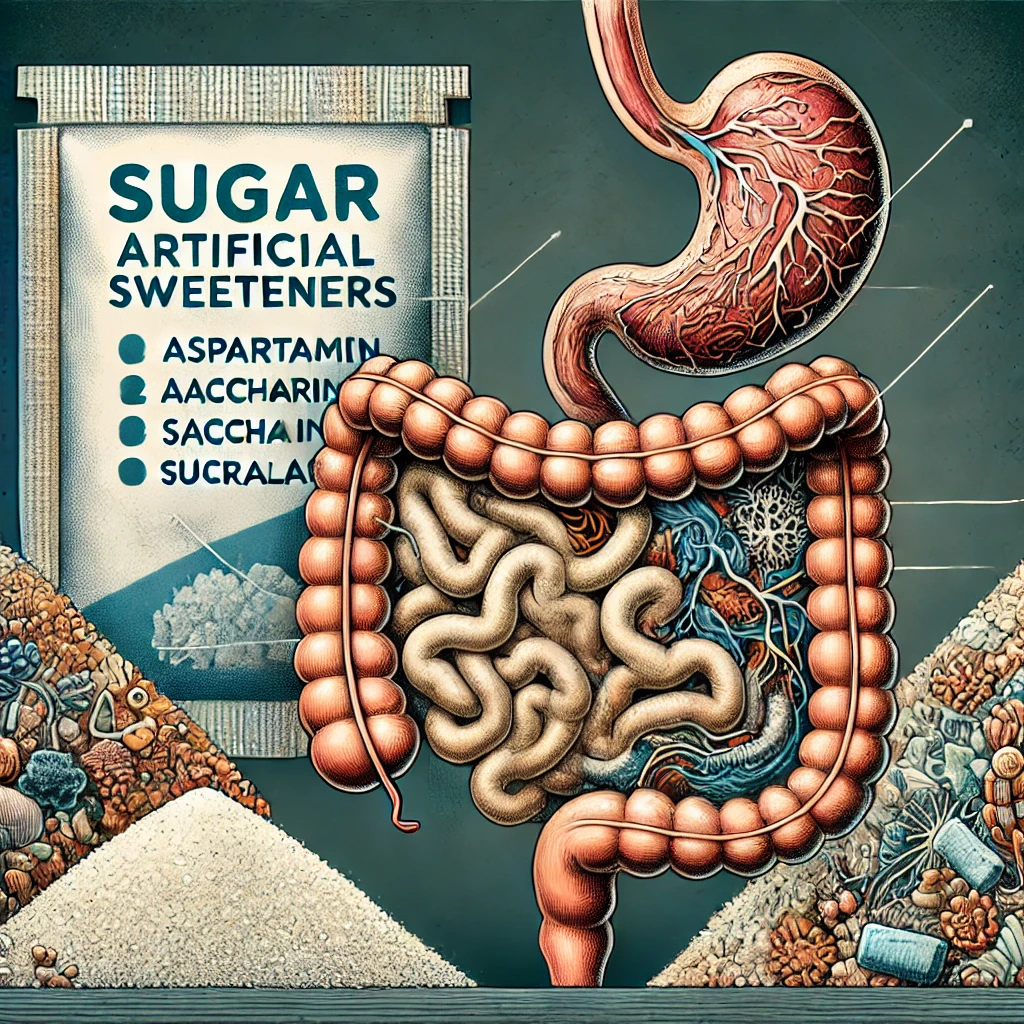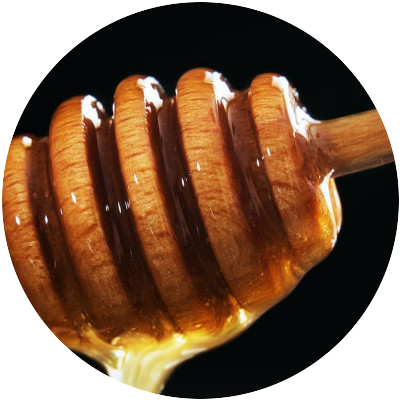
There has been a controversial debate about artificial sweeteners. On the one hand, artificial sweeteners are claimed to help reduce excess sugar intake and decrease weight.
However, on the flip side, they are blamed for causing more health issues like cancer, relegating gut health, and making blood sugars out of control.
What are artificial sweeteners?
Artificial sweeteners are fake sugars or sugar substitutes containing chemicals that taste like sugar but way sweeter than sugar.
You only need a small amount to sweeten anything you’re consuming, and most artificial sugars have no calories. This no-calorie notion makes them popular among people who go to sugar substitutes whenever they want to use them.
What are the effects of artificial sweeteners on gut health?
The effects of artificial sweeteners on gut health are…
- Some are known to increase weight because it makes changes to some of the gut bacteria in the gut. Research done on mice has shown significant changes to the gut microbiome, while the harmful microbes were less affected.
- We have been told over and over again that these artificial sugars have no calories and can only replace traditional sugar without causing any health issues, but this is further from the truth. A study that was published in the Cell journal has proved that four artificial sweeteners have shown an increase in blood sugar levels. Also, some changes to the gut microbiome were noted.
- Some artificial sweeteners are linked to cancer.
- They make changes to the brain causing neurological dysfunction
- They can cause Alzheimer’s Disease
- They also increase the susceptibility to autoimmune diseases.
What are the worst artificial sweeteners?
Artificial sweeteners were introduced to the world around the 1950s. Much scientific research shows the damage these fake sugars can do to your health. They cause headaches, obesity, diabetes, and cardiovascular diseases. So why risk it and not ditch it? I know it’s easier said than done ha!
Anyway, here are some of the worst fake sweeteners to avoid, and try replacing them with natural sweeteners like raw honey.
- Aspartame under brand names (Equal, Nutrasweet) is 200 times sweeter than table sugar. Only a tiny amount is needed to make any beverage sweet. It is found in food, drinks, prescription, and over-the-counter drugs. It is hidden in most unexpected consumable foods and drinks. It is also found in non-heated food and drinks. Examples of foods with Aspartame are sugar-free gum, sugar-free ice cream, and light yogurt extra.
Some health problems you can get while consuming this fake sugar are headaches, migraines, mood disorders,s, and even mania. This study shows the changes and side effects of aspartame when consumed
- Sucralose is sold as Splenda in the market. It is 600 times sweeter than sugar. It was something that was found accidentally by a British scientist in 1976. It contains chlorine, which is a deadly substance. It is used in many food products. Side effects of this artificial sweetener are
- It can increase blood sugar levels
- High temperatures while using Splenda can break it down into a deadly substance which can increase the risk of cancer
- Saccharin ( Sweet N Low) It has zero calories, about 300-400 times sweeter than regular sugar. It is mainly used in many children’s medications to make kids take medication easier. They also add to chewable medication, syrups, and even prescriptions. Side effects include nausea, stomach upset, tachycardia, and some cancer.
- Acesulfame K is made out of potassium and is mostly found in sugar-free chewing gum, yogurt, soft drinks, protein shakes, and baked goods extra. It is 200 times sweeter than table sugar.
Some risks associated with this sweetener are cancer, mood problems, nausea, eyesight problems, and hormonal disturbances.
- Xylitol is a sugar alcohol. It is considered a natural sugar, although there is some controversy. It has zero calories. An example of these sugar alcohols are Mannitol and sorbitol. Our bodies don’t absorb this sugar alcohol well therefore we can have some allergies and sensitivity. The intestinal microbiota is also disrupted, causing bloating, gas, cramping, and diarrhea. A test on mice studies indicated some changes in the gut microbes.
Are there any benefits to using artificial sweeteners?
Yes, and some of them are: for instance
- Sweetening your food without the sweetness of regular sugar.
- Fewer calories than sugar
- Some claim it helps diabetics by giving them an alternative to sugar and doesn’t increase their blood sugar.
Here is why you should ditch sugar substitutes
- Weight gain intensifies as you eat more and therefore the risk of type 2 diabetes increases and heart disease as well. In a study of a group of rats fed food with artificial sugar, their brain was triggered to eat more, slowing down their metabolism and gaining weight compared to the other rats fed food with regular sugar.
- They are extremely addictive, as Dr. Hyman stated when he saw one of his patients, who stated they can’t stop drinking diet soda, “I drink one in the morning and one in the evening”, and “It isn’t just their imagination”. In another study, rats were shown to feed on artificial sugar rather than cocaine
- Artificial sugar tricks your brain into thinking you’re eating real sugar by stimulating your taste buds. It makes you hungrier, and therefore you start consuming more food. As a result, slowing down your metabolism and gaining weight.
Alternatives to artificial sweeteners
There are many alternatives to replacing artificial sugars that can satisfy your palate without the side effects of artificial sweeteners.
- Stevia – Is one of the popular natural sugars that’s from a tree. It is sweeter than table sugar and has no calories less is required to sweeten any beverage/food. Things you should pay attention to when buying stevia: make sure it’s non-GMO and buy only stevia that is processed with water and not chemical-based methods.
- Coconut Sugar – It’s more natural and nutritious than normal sugars and has nutrients like zinc, iron, magnesium, and polyphenol. It doesn’t have the side effects of refined sugar.
- Raw Honey – Honey has many benefits compared to other natural sweeteners. Some of the benefits include strengthening the immune system, treating wounds, and even seasonal allergies. It is a superfood and one of the best natural sweeteners in human history.

- Molasses – This is a natural sweetener with a unique flavor.
- Date Sugar – This alternative can be made into date paste. It’s good for baking and is used as an alternative to refined sugar. It is easily digestible and provides minerals such as copper, potassium, magnesium, manganese, and vitamin B6. Also plays a role in reducing high cholesterol.

Conclusion
As you have seen, artificial sugars have many side effects, as mentioned above, and the best alternatives would be natural sweeteners.
As far as taste preferences are concerned as well as health, the choices are many, unlike fake and refined sugar their many choices.
Some of the best substitutes are honey, stevia, molasses, coconut sugar, date paste, etc. Unlike artificial sugar, natural sweeteners have many benefits. For example, honey provides antibacterial properties and boosts immunity. The key is eating things in moderation, including natural sugar.
If you’re concerned about living healthy, making a good alternative to artificial sugars is paramount to your health. However, you don’t have to give up sweets entirely but replace fake and refined sugars. Using them in moderation is also key.
References
- https://www.the-scientist.com/daily-news/sugar-substitutes-gut-bacteria-and-glucose-intolerance-36835
- https://www.ncbi.nlm.nih.gov/pmc/articles/PMC8156656/#:~:text=These findings indicate that saccharin,well-studied characteristics of metabolism.
- https://www.ncbi.nlm.nih.gov/pmc/articles/PMC3856475/
- https://www.scientificamerican.com/article/some-sugar-substitutes-affect-blood-glucose-and-gut-bacteria/
- https://www.ncbi.nlm.nih.gov/pmc/articles/PMC3876090/
- https://www.ncbi.nlm.nih.gov/pmc/articles/PMC3772345/
